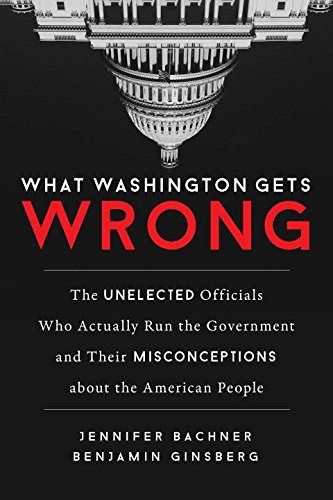 A few weeks ago, the Washington Post Wonkblog featured a post discussing a new book describing the DC bubble, and how lack of familiarity breeds contempt:
A few weeks ago, the Washington Post Wonkblog featured a post discussing a new book describing the DC bubble, and how lack of familiarity breeds contempt:
As Bachner and Ginsberg argue, civil servants exercise real power over how the government operates. They write and enforce rules and regulations. They might not decide what becomes law, but they have a hand in how laws are drawn up and how laws are implemented.
For all their influence, though, nearly all of these technocrats are unelected, and they spend most of their time with people who are just like them — other highly educated folk who jog conspicuously in college tees and own a collection of NPR totes.
———————————
The article itself demonstrates much of the contempt and lack of self-awareness that Bachner and Ginsberg found in their survey. He manages to turn a complaint by the governed against their governors into a complaint about lack of respect by the provinces for the Capital. For anyone with even passing familiarity with DC, and the incestuous relationship between the government and the press there, this shouldn’t be too surprising.
Look past that, however, to some of the possible solutions. Term limits for civil servants are an interesting idea on a number of levels. The K-Street revolving door, where former bureaucrats sell their expertise in navigating the system to cronyists sets up all the wrong incentives. Giving them less time to complicate the system and to learn the ropes might at least arrest some of the rot. (There are benefits to institutional memory, especially in the non-regulatory foreign policy realm, and some exceptions could be written in for those organizations.)
Still, how you implement something like that without further concentrating power in the hands of *current* bureaucrats is hard to imagine.
More intriguing is the idea of distributing the government throughout the country to keep it closer to the people it governs. The problem with that is that it doesn’t seem to work. The rules may be made in DC, but there are already EPA or BLM offices all over the West. Those offices are supposed to be a source of information for DC, but even assuming they operate that way, it doesn’t seem to keep them from trampling all over the locals.
One possibility might be to disperse them even more. Get rid of the region BLM office in Denver that wanders all over Colorado and Wyoming, and put the officers in small towns, in pairs, and limit their range even further.
In addition, require the DC staff to do year-long rotations out in the hinterlands before they can start “analyzing” with periodic refreshers living with the people whose lives are affected by their regulations. I speak from personal experience when I tell you that I never learned as much about the country as during that year I spent in Omaha.



